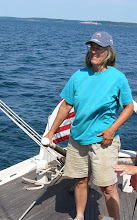One Woman's Quest for a better toilet
In honor of World Water Day on March 22 I am publishing a tribute to a young entrepreneur in England who is working towards cleaner water.
Americans “ love to flush and forget” says Virginia Gardner, recent graduate, industrial designer and founder of the small startup company Loowatt. But the practice of crapping in our drinking water and then using chlorine to kill the pathogens (potentially creating toxic trihalomethanes in the process) is deluded if not downright stupid. Humans, however, are nothing, if not ingenious. In October 2010 the WTO ( World Toilet Organization) founded in 2006 by another visionary named Jack Sim whose motto is 'live a useful life', held its annual summit in Philadelphia bringing together activists, engineers, and health experts at a showcase and information exchange for contractors and the general public on sustainable sanitation.
Waterless toilets that compost waste can operate effectively to produce pathogen free compost without power or water. They have been popular for years with owners of seasonal homes and cabins as they are simple to install and need no costly water hungry septic system. However, the developed world with its existing infrastructure of sewage plants and waterlines has lagged in adopting the technology more widely, while cost has limited their use in third world countries. But time and water are running out. Yemen, some believe, could be the first nation in modern history to run completely out of water. Using less and not putting human sewage in it, is vital to the health and productivity of billions of humans and to earth's water, too.
There are a number of intriguing new designs for waterless toilets coming on the market. Virginia Gardener presented a paper at the WTO on her toilet that generates power. She first worked on the project as a graduate student at The Royal College of Art in London.
After a couple of false starts (the red wriggler worm model was a little too “earthy” and was quickly scrapped) she worked out a system with an inexpensively produced waterless toilet to collect poo in an air tight package that is then transferred to a separate biodigester. This in turn creates and collects methane for use as a cooking fuel along with liquid fertilizer and solids that can be composted. The digester is a basic low tech affair wrapped in insulation made of hemp and flax fibers to preserve heat during the process. ( the methane producing bacteria require a warm environment for efficient gas production.)
A test toilet was set up at the Willowtree Marina near London's Heathrow Airport in the fall of 2010 and Virgina and her co workers at LooWatt continue to refine the concept and it's market. For more on her endeavor and that of the WTO (helping save our water one flush at a time). And don't miss The Big Squat on Nov 19 2011!
visit http://www.loowatt.com/ ( where a short and enlightening video describes the concept of human generation)
and Jack Sim's effort http://www.worldtoilet.org/index.asp


